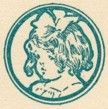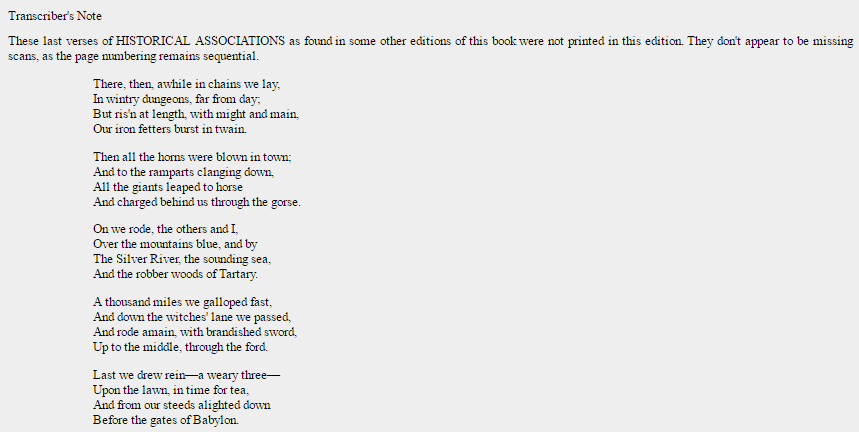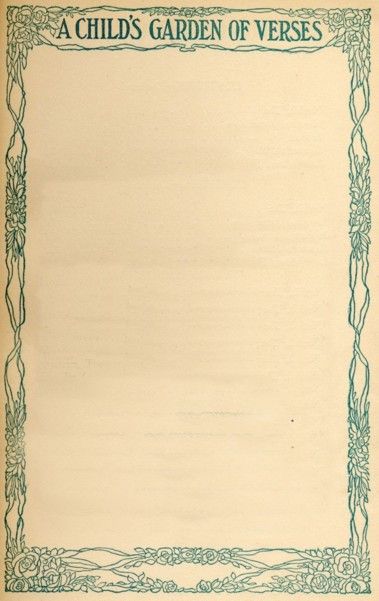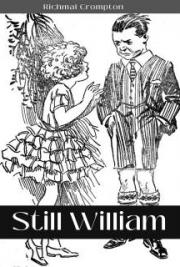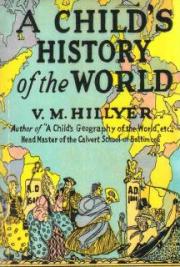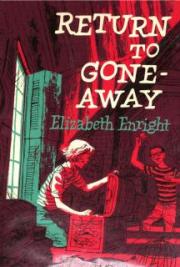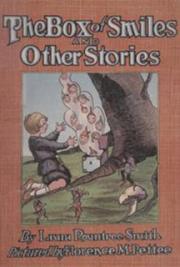Envoys
TO WILLIE AND HENRIETTA
If two may read aright
These rhymes of old delight
And house and garden play,
You two, my cousins, and you only, may.
You in a garden green
With me were king and queen,
Were hunter, soldier, tar,
And all the thousand things that children are.
Now in the elders' seat
We rest with quiet feet,
And from the window-bay
Watch the children, our successors, play.
"Time was," the golden head
Irrevocably said;
But time which none can bind,
While flowing fast away, leaves love behind.
TO MY MOTHER
You too, my mother, read my rhymes
For love of unforgotten times,
And you may chance to hear once more
The little feet along the floor.
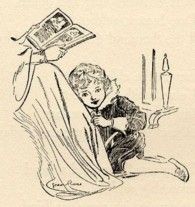
TO AUNTIE
Chief of our aunts—not only I,
But all your dozen of nurselings cry—
What did the other children do?
And what were childhood, wanting you?
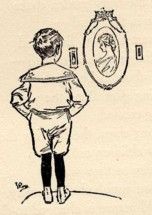
TO MINNIE
The red room with the giant bed
Where none but elders laid their head;
The little room where you and I
Did for awhile together lie
And, simple suitor, I your hand
In decent marriage did demand;
The great day nursery, best of all,
With pictures pasted on the wall
And leaves upon the blind—
A pleasant room wherein to wake
And hear the leafy garden shake
And rustle in the wind—
And pleasant there to lie in bed
And see the pictures overhead—
The wars about Sebastopol,
The grinning guns along the wall,
The daring escalade,
The plunging ships, the bleating sheep,
The happy children ankle-deep
And laughing as they wade:
All these are vanished clean away,
And the old manse is changed to-day;
It wears an altered face
And shields a stranger race.
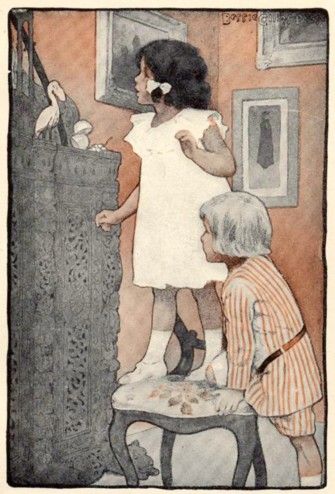
But when we climbed upon a chair,
Behold the gorgeous East was there!
The river, on from mill to mill,
Flows past our childhood's garden still;
But ah! we children never more
Shall watch it from the water-door!
Below the yew—it still is there—
Our phantom voices haunt the air
As we were still at play,
And I can hear them call and say:
"How far is it to Babylon?"
Ah, far enough, my dear,
Far, far enough from here—
Yet you have farther gone!
"Can I get there by candlelight?"
So goes the old refrain.
I do not know—perchance you might—-
But only, children, hear it right,
Ah, never to return again!
The eternal dawn, beyond a doubt,
Shall break on hill and plain,
And put all stars and candles out
Ere we be young again.
To you in distant India, these
I send across the seas,
Nor count it far across.
For which of us forgets
The Indian cabinets,
The bones of antelope, the wings of albatross,
The pied and painted birds and beans,
The junks and bangles, beads and screens,
The gods and sacred bells,
And the loud-humming, twisted shells!
The level of the parlor floor
Was honest, homely, Scottish shore;
But when we climbed upon a chair,
Behold the gorgeous East was there!
Be this a fable; and behold
Me in the parlor as of old,
And Minnie just above me set
In the quaint Indian cabinet!
Smiling and kind, you grace a shelf
Too high for me to reach myself.
Reach down a hand, my dear, and take
These rhymes for old acquaintance' sake!
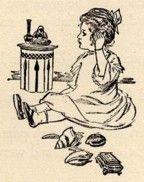
TO MY NAME-CHILD
I
Some day soon this rhyming volume, if you learn with proper speed,
Little Louis Sanchez, will be given you to read.
Then shall you discover, that your name was printed down
By the English printers, long before, in London town.
In the great and busy city where the East and West are met,
All the little letters did the English printer set;
While you thought of nothing, and were still too young to play,
Foreign people thought of you in places far away.
Ay, and while you slept, a baby, over all the English lands,
Other little children took the volume in their hands;
Other children questioned, in their homes across the seas:
Who was little Louis, won't you tell us, mother, please?
II
Now that you have spelt your lesson, lay it down and go and play.
Seeking shells and seaweed on the sands of Monterey,
Watching all the mighty whalebones, lying buried by the breeze,
Tiny sandy-pipers, and the huge Pacific seas.
And remember in your playing, as the sea-fog rolls to you,
Long ere you could read it, how I told you what to do;
And that while you thought of no one, nearly half the world away
Some one thought of Louis on the beach of Monterey!
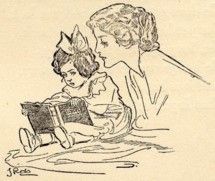
TO ANY READER
As from the house your mother sees
You playing round the garden trees,
So you may see, if you will look
Through the windows of this book,
Another child, far, far away,
And in another garden, play.
But do not think you can at all,
By knocking on the window, call
That child to hear you. He intent
Is all on his play-business bent,
He does not hear; he will not look.
Nor yet be lured out of this book.
For, long ago, the truth to say,
He has grown up and gone away,
And it is but a child of air
That lingers in the garden there.
